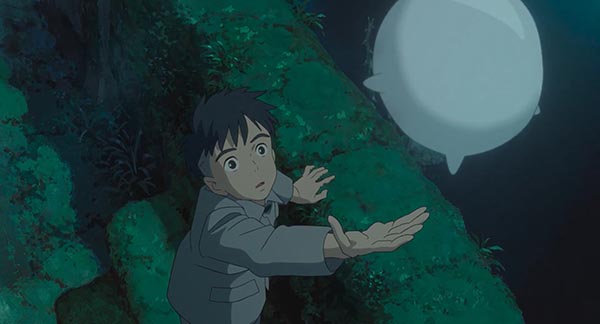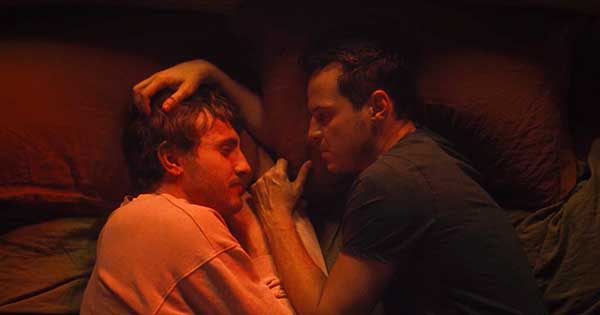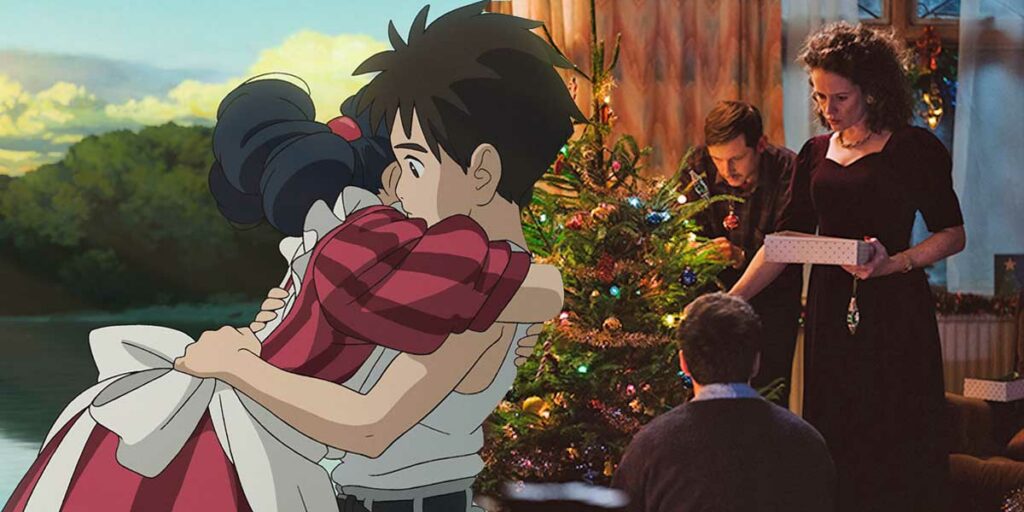The Boy and the Heron and All of Us Strangers explore the same specific kind of grief, delivering a devastating watch to those who experienced it.
The two films I liked the most at this year’s BFI London Film Festival are also two movies that absolutely devastated me, leaving me an emotional mess for days to come. Why? Because, besides being extremely well-crafted movies, both Hayao Miyazaki’s The Boy and the Heron and Andrew Haigh’s All of Us Strangers deal with a specific kind of grief that feels very close to me: that of losing a parent when you’re young. And though they are very different from one another, what they have in common is that they’re bound to affect those who experienced that pain on a completely different level.
Loosely inspired by Genzaburo Yoshino’s novel “How Do You Live?,” The Boy and the Heron (Kimitachi wa Do Ikiruka) is about a young boy named Mahito Maki (Soma Santoki) who, one day, suddenly and unexpectedly loses his mother to a fire. Before we even have time to process the news, director Hayao Miyazaki takes us to the countryside, where his father Shoichi (Takuya Kimura) leaves him with his pregnant aunt/“new mother” Natsuko (Yoshino Kimura) to start a new life while he’s off to work. But things aren’t as easy for our young protagonist, as not only does he have to adjust to a completely new lifestyle, but a mysterious heron (Masaki Suda) has been trying to draw him towards a sinister-looking tower where people have been disappearing.
One day, Mahito can’t take it anymore: to make the visions disappear, and perhaps also to let out some of his grief, he hits his own head with a rock, which puts him on bedrest for a while. But when he recovers, he discovers that Natsuko has disappeared. And so, he decides to rescue her and follows the heron — which turns out to have a small, bald man inside it, but that’s another story — bringing unwitting house maid Kiriko (Kō Shibasaki) with him.
In the best Studio Ghibli tradition, Mahito’s journey is as magical and disquieting as it is nearly incomprehensible, at first. All we know is that the fates of Natsuko, Kiriko, and perhaps even Mahito’s own mother rest in his hands, but Mahito’s journey also involves souls who are waiting to be born, fire that burns but can also heal, a society of evil but extremely well-organised parakeets, and a universe whose precarious balance only Mahito can restore.

But it’s also a highly symbolical journey, and once you stop looking at the single pieces of the puzzle but are able to take it all in, that’s when the message of the film shines through. In The Boy and the Heron, Miyazaki tells us that overcoming this kind of grief doesn’t just happen, but it’s an active choice you make. The parent we’ve lost will never be replaced or forgotten, but there comes a time when you realise that you have to make do with the people around you who are still alive, no matter how much you hate your current life. Though you’ll always carry the burden of your loss — here represented by the actual physical hole in Mahito’s head, a void that will heal and be replaced by a scar but never fully disappear — and you’ll always feel different from those around you, a lonely, chaotic life is better than no life at all, because it’s all you’ve got.
When I lost my mum to cancer, as a teenager, I felt a void that only those who’ve lost a parent when they were young can understand. It’s not just a matter of never being able to speak to that person again: it’s also deeply connected to your own sense of identity. The person who was supposed to guide you through life is no longer there to do so, and you’re left to figure out who you are all on your own, feeling alone despite being surrounded by well-meaning people at all times. And as tempting as it is to close yourself off to the world completely, there also comes a time when you realise that the only way to honour those you’ve lost is to carry their memory with you, and live an ordinary life not just for you, but for them too. The Boy and the Heron beautifully and heart-wrenchingly captures this choice: the moment when the scarred, grief-stricken child consciously decides to grow up.
Andrew Haigh’s All of Us Strangers is a very different movie, and yet it’s also similar in many aspects, tackling similar themes but from the point of view of the grown-up “child,” who’s become an adult. It’s also even more devastating than Miyazaki’s animated tale. The film revolves around a man named Adam (Andrew Scott, of 1917 and Ripley), who one day has a chance encounter with what would appear to be his only neighbour (Paul Mescal’s Harry), and a relationship blooms between the two. From the start, it’s clear that they’re both broken, the former haunted by literal ghosts from his past and the latter drowning his own sorrows in liquor. But when they’re together, a certain tenderness comes through: they seem to have really found each other.
But Harry isn’t the only person with whom Adam hangs out. One night, we see him meet two relatives of his (Claire Foy and Jamie Bell), though we can’t quite figure out who they are. Is one of them a sibling? It can’t be, as they both remember moments from his childhood. Are they his aunt and uncle? Surely not, as they look just as young as he his. But suddenly, it hits us: they’re his mum and dad, just as young as they were right before a car crash killed them, and we’re in Adam’s childhood home.
One visit after another, we watch Adam reminisce with his parents, try to get to know them as adults, and spend time with them doing absolutely nothing. What were his parents like, if seen from the point of view of a grown-up? What would they think of the choices he made? Would they still love him if they knew who he really was? Adam finally gets to know the answers to questions that have been haunting him his entire life, but he’s also alienating himself from the world around him, and there comes a point when he has to stop living in the past.

But it’s not so easy, as Adam doesn’t really have anything, completely devastated by a loneliness he’s been carrying with him for his entire life, and that isolates him even more. It doesn’t even matter if Adam’s parents are somehow actually there or if they’re just in his head: what matters is the hole their absence left on him — a hole that he’ll never be able to fill, because this kind of grief never leaves you.
There’s very little hope in All of Us Strangers, where Haigh seems to confirm that the only people who can understand that kind of grief are those who have experienced it, and who are just as broken as we are and therefore unable to fix us or even be there for us. But it’s also what makes the film so strangely comforting to those very same “unfixable” people, whose grief becomes one with Adam’s and who, by the time the credits roll, are able to let go, even if just for a minute.
The Boy and the Heron and All of Us Strangers are very different films, but they both explore a very specific kind of grief that those who’ve experienced will immediately recognise. Both will make you feel seen if you’re one of those people, and both might not reach you as strongly if you aren’t. But both are therapeutic in the way they unapologetically and bravely let their message come through: this kind of pain never goes away, but a lonely life as a broken human is still better than no life at all.
The Boy and the Heron and All of Us Strangers were screened at the 2023 BFI London Film Festival and are now available to watch on digital and on demand. Read our reviews:

